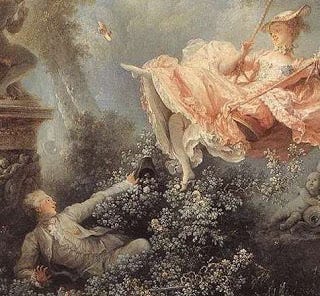Poetry Day - Let it be for nought
I feel like this blog has become not much more than a repository of things I fancy of late, and yet I have one service to humanity, and it’s this: poetry.
Poetry, so it has been said, utilises both sides of your brain simultaneously, and this is a good thing. (See a little summary in Simone’s post here about left and right brain and their engagement in poetry and singing, and I was talking to Rob Smith about this very thing last Sunday night.) In the reading of poetry you may delay the disintegration of your mind, and it’s a good bit more interesting than messing with numbers (though my Aunt recently did get me doing Sudoku). Read it with a coffee, because for all it’s other evils, coffee may preserve some of your mental functions also.
And so to make sure it is a full and well-rounded education you are receiving here, I thought I’d post what is one of Elizabeth Barrett-Browning’s most famous Sonnets from the Portuguese. I am in two minds (no pun was intended!) about this poem when it is taken in isolation. Certainly, once we have gained a love, we hope it will endure through all alterations and all faults. But in gaining a love, I suspect the recipient does like to believe that there are reasons, embedded somewhere within them, for it’s development, and that it isn't actually for “nought”. But then, clearly loving for nought is the more Christlike of the two.

Jean-Honoré Fragonard (1732–1806)
xiv
IF thou must love me, let it be for nought
Except for love's sake only. Do not say,
“I love her for her smile—her look—her way
Of speaking gently,—for a trick of thought
That falls in well with mine, and certes brought
A sense of pleasant ease on such a day”—
For these things in themselves, Belovèd, may
Be changed, or change for thee—and love, so wrought,
May be unwrought so. Neither love me for
Thine own dear pity's wiping my cheeks dry,—
A creature might forget to weep, who bore
Thy comfort long, and lose thy love thereby!
But love me for love's sake, that evermore
Thou mayst love on, through love's eternity.
Elizabeth Barrett-Browning

